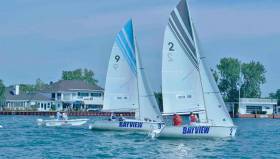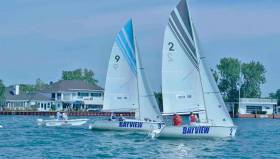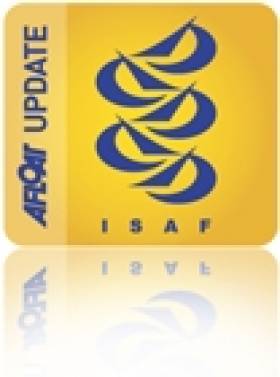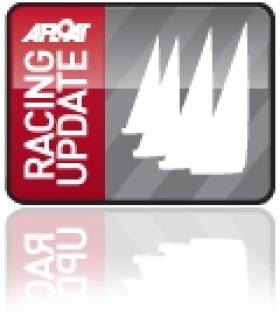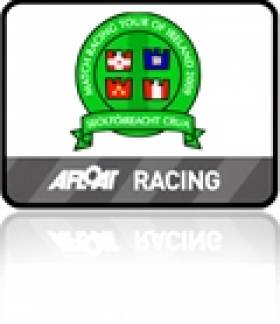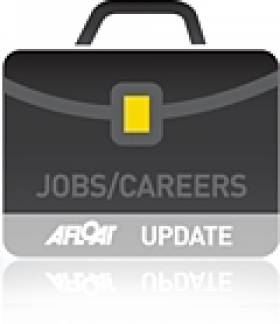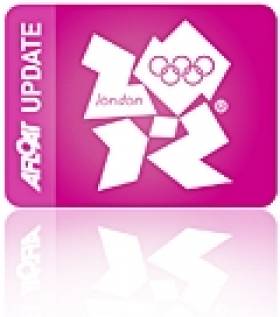Displaying items by tag: Scott Flanigan
Tough Week For Trinity Trio At Detroit Cup
#TeamRacing - It was a tough week in Michigan for Dan Gill, Richard Roberts and Scott Flanigan at the 10th annual Detroit Cup, which concluded yesterday (Sunday 27 August).
But the TCD team racing trio managed to stay above the bottom of the final standings, scoring a win against the Australian contingent headed by Will Boulden that took the petit final to secure third place.
Defending champions Harry Price, Murray Jones and Cameron Seagreen of DownUnder Racing had little trouble defending their title despite conditions that ranged from light and flunky to moderate over the four days of competition.
Australian Price is now the only two-time winner of the Detroit Cup, solidifying his team’s six position in the world match race rankings.
Trinity Trio In Stateside Competition At 10th Detroit Cup
#TeamRacing - Afloat’s Sailor of the Month for March is competing with his Trinity College teammates at the Detroit Cup in the USA this week.
Richard Roberts joins fellow TCD helmsmen Scott Flanigan and Dan Gill on the Plain Sailing team at the 10th anniversary of the Bayview Yacht Club team racing event, which starts tomorrow (Thursday 24 August) with the round robin portion.
Eight skippers and crews representing five nations will take part in the four-day competition that marks the second stage of the USA Grand Slam series, as Scuttlebutt Sailing News reports.
The fleet includes defending champion Harry Price and his DownUnder Racing team from Sydney, Australia, alongside Murray Jones and Cameron Seagreen – currently ranked sixth in the world team racing stakes.
Irish Compete at Royal Southern World Match Racing Tour
#wmrt – Held between the 10-14th of June in a wide range of conditions on the Solent. Day One saw probably the most consistent breeze, with day two and four cut short due to a lack of wind and day three experiencing too much.
Despite this, the race committee completed a full round robin along with semi finals and full decider matches for the top 6 teams.
This years Grade 2 regatta had the added bonus of being part of the World Match Racing Tour, with points awarded to the top 6 teams towards the overall world championship series.
Several Irish competitors were involved including Philip Bendon's team, who had a tough week.
The two regular Irish crew members aboard Mark Lees's GBR Match Racing- Howth's Scott Flanigan and Shane Diviney were joined this week by fellow club mate Eamonn Bourke in an almost all Irish team!
After a slow start to the event, Lees's team sailed an almost flawless day two and three losing only to Ian Williams (Team GAC Pindar) to finish the round robin tied for 3rd place. This form was continued in the semi final against Williams were they lost 3-2, having taken it to the full 5 matches following the only defeats experienced by the 5 time and reigning World Champion.
Williams went on to win the final 2-0 against the promising Redline Racing team from Perth skippered by Matthew Jerwood.
Another Top 4 finish at the Royal Southern continues a string of good results for the GBR match racing team having also placed 2nd at last weeks Grade two in Helsinki, as they build towards a tour card spot on the World Match Racing Tour. They currently lie 10th on the overall standings, with Jerwood's team the current leaders.
Howth Yacht Club Sailors on World Match Racing Tour
#wmrt – The World Match Racing Tour sees a new expanded schedule for the 2015/16 Season. The tour now consists of two levels of competition. Along with the usual 7 World Championship events the tour now includes a number of smaller competitions which are scored at half points but count towards the overall World Match Racing Tour Standings. Howth sailors Shane Diviney and Scott Flanigan have been competing in the first three regattas of the 2015/16 World Match Racing Tour season. It's another Irish dimension the tour that already sees Cork Match Racer Philip Bendon contest World Match Racing Tour on the Hamble.
Having narrowly missed out on selection for a tour card Diviney and the 36 Below Racing Team, with skipper Chris Steele of New Zealand headed to Long Beach California to compete in the Ficker Cup in early May. The event was a qualifier for the prestigious Congressional Cup to be held the following week. With the top two teams from the Ficker Cup qualifying for the Congressional Cup the objective was clear. The eight teams completed a double round robin in the fleet of evenly matched Catalina 37's. After two days of racing 36 Below Racing came out on top of the qualifying series only losing 2 of their 14 matches. They went on to win their semi-final 2-0. With a berth in the Final awaiting the team were relieved to be assured at least a top two finish and an entry to the Congressional Cup. The final saw the team come up against the local favourite Dustin Durant and his Long Beach Match Racing Team. Their experience in the Catalina 37's was not enough to overcome Steele and his 36 Below Racing team and they went on the win the finals 2-0 and take the Ficker Cup.
The Congressional Cup saw a big step up in the level of competition with most of the World's Top Match racers in attendance, including current World champion Ian Williams and defending Congressional Cup champion, Taylor Canfield. Racing was held just off the end of Long Beach Pier which attracted a big crowd of spectators each day. 36 Below Racing had a strong start to the regatta winning 4 from 5 on the first day of racing. They went on the finish the round robin in 6th position with a record of 6-5 which guaranteed them a spot in the quarter finals. The team came up against fellow Kiwi Phil Robertson in the quarterfinal. Phil sailed three perfect races to take the series 3-0. Although disappointed not to make the semi-finals the team were pleased with their performance in a competitive field. The event was eventually won by Taylor Canfield who beat Robertson 2-1 in a close final.
The World Match Racing Tour then moved to Langenargen, Germany with Scott Flanigan and Shane Diviney joining Mark Lees and his team from the U.K who received a wild card entry to the event. The regatta is known for its light and shifty race course making it extremely challenging to get the heavy Bavaria 40's around the course. The team made an impressive start to their first World Match Racing Tour event with a strong showing in the round robin with a score of 6-5. This left them in 6th place and gave them a spot in the quarter finals. They came up against the very experienced team of Eric Monin and his crew from Switzerland. Monin's experience prevailed as he did a better job of keeping the boat moving around the very light race track to take the series 3-0 in front of a spectator packed lake front. He went on to take second place at the regatta. The team were satisfied with their showing and finished a very credible 6th place.
It is only the beginning of a very busy season for both teams as they prepare to compete in a number of international regattas over the coming months.
Howth Yacht Club's Flanigan Takes Scarlino Match Race Victory With Team GBR
#matchrace – London Olympic sailor Scott Flanigan of Howth Yacht Club was sailing with the Great British Match Racing Team again at the weekend and won the Scarlino Grade 3 match race event, beating world number 17 Tomislav Basic in the final race to take the event.
The win will see the team boosted into the Top 20 in the world rankings for the first time.
Flanigan is sailing with Mark Lees, Matt Haslam and James Hemmingway for the remainder of the season as they target a place on the World Match racing tour for the 2016/17 season.
The event took place in Club Nautico Scarlino, Italy and marked the start of the European match racing circuit. There was 9 teams from 5 nations competing.
A full round robin was completed in extremely wet and variable conditions over two days. Mark Lees' team won 7 of their 8 races, only dropping a race when their spinnaker halyard snapped. The final race against top seed Tomislav Basic from Croatia was the decider, with the GBR match racing team leaving their best sailing till last.
Cork's Philip Bendon was also competing in Antibes, France in another Grade 3 where he finished fourth.
Both teams will be vying for European places at the Nations Cup qualifier in Howth in early May, with the Grand Finals being held in Russia in July.
Team positions:
Mark Lees : Helm
Scott Flanigan: Mainsheet trimmer & tactician
Matt Haslam: Trimmer
James Hemmingway: Bowman
#croatiasailing – Malahide reader Scott Flanigan, the 2012 Olympic sailing team member, has written to advise of an opportunity for young sailors who would like to work as a skipper in Croatia this summer.
The 'Yacht Week' is a sailing event in Croatia, Greece and Italy that brings young people from all over the world to sail together in flotillas of 50 boats. The guests are 20-30 years old and every week is a mix of sailing, concerts, dinners and parties.
'It was something I took part in over the New Year Break in the Caribbean' and I think it is a great opportunity for Irish sailors' Flanigan told Afloat.ie
The 'Yacht Week' is currently recruiting skippers for the summer to work professionally on 40-55ft sail yachts. All expenses during the week are paid for as well as a minimum salary of €350/week (plus tips!) says Flanigan. They offer up to 12 weeks of work during the season.
Requirements are to hold a basic navigational certificate (Level 4 or Day skipper are sufficient) and a VHF license. You also need to be an experienced sailor. Keelboat experience is not necessary since you will learn all you need to become a skipper during a weeks skipper course in Croatia.
Please contact [email protected] for more information using the reference code: IRL1.
Also check out www.theyachtweek.com and www.skipperacademy.com
Worrall Thompson Thanks Irish Wife at Fundraiser for 470 Duo
#WORRALL THOMPSON - Celebrity chef Anthony Worrall Thompson - in Dublin at the weekend for a fundraiser for Olympic hopefuls Ger Owens and Scott Flanigan - has credited his Irish wife with being the "rock" that kept him going through his recent shoplifing controversy.
"She is absolutely amazing," he told the Irish Independent of his Dublin-born wife Jacinta Shiel. "We met nearly 20 years ago. She's gorgeous, she's got a great heart and she's my rock."
Worrall Thompson was at Malahide Rugby Club on Saturday to judge a celebrity chef night in aid of the Olympic 470 duo's bid for a spot at the 2012 games, as previously reported on Afloat.ie.
He kept his promise to attend the event following last Monday's public apology for his "stupid and irresponsible actions" after he was caught shoplifting cheese and wine from a Tesco store.
Worrall Thompson also donated his appearance fee from RTÉ's Saturday Night Show to Owens and Flanigan, who require sponsorship to supplement their support their funding from the Irish Saling Association.



























